An important aspect of 2025 digital marketing strategy is the business reputation management. As consumers learn to use online review, the social media discussions, and search results to guide their purchasing decision-making, business organizations would not have an option but to turn into the areas of operation where they are supposed to manage and monitor their online appearance.
The latest Business Reputation Management tools are a blend of artificial intelligence, real-time analytics, and automated response to promote positive brand perception among businesses on a variety of platforms. These advanced services allow companies to follow mentions, sentiment analysis, as well as provide responsive answers to feedback and carry out strategic campaigns to gain a good reputation on the Internet.
Importance of Reputation Management Tools for Businesses
- Brand Protection: Track and respond to bad content before it can affect customer perception and business volume.
- Customer Trust Building: Uphold a positive relationship at all aspects of digital touchpoints to win some credibility.
- Crisis Prevention: The potential problems are identified in a timely manner to prevent damage and development of a bad reputation proactively.
- Competitive Advantage: The best online reputation has a direct impact on customer choice and market positioning over competitors.
- Revenue Impact: Independent scores and favorable ratings are very helpful in raising the conversion levels and customer acquisition expenses.
- Poison intelligence: advanced analytics offer operational business and marketing intelligence.
Key Features to Look for in Reputation Management Tools
- Real-Time Monitoring: Continuous tracking of brand mentions across social media, review sites, news outlets, and forums
- Multi-Platform Integration: Seamless connectivity with major review platforms, social networks, and business listing directories
- Sentiment Analysis: using AI characterized emotional tone classification to classify and rank feedback better to respond to them.
- Automated Response Systems: workflow automation and Smart Reply functions to provide customers with timely business replies.
- Analytics Dashboard: Comprehensive reporting tools with customizable metrics, trends analysis, and performance tracking capabilities
- Crisis Management: Alert systems and escalation protocols for immediate notification of potential reputation threats and more effective than manual approaches.
Comparison Table of Top Reputation Management Tools
| Tool | Starting Price | Best For | Key Strength | Free Trial |
| Brandwatch | $800+/month | Enterprise | Advanced analytics | Yes |
| Yext | $199/month | Local business | Listings management | Yes |
| Sprout Social | $249/month | Social media | Engagement tools | 30 days |
| GatherUp | $99/month | Small business | Review generation | 14 days |
| Trustpilot | $199/month | E-commerce | Trust badges | Yes |
| Mention | $25/month | Startups | Affordable monitoring | 14 days |
| Google Alerts | Free | Basic monitoring | Cost-effective | N/A |
| Birdeye | $299/month | Multi-location | All-in-one platform | Yes |
| Brand24 | $79/month | SMBs | Social listening | 14 days |
| NetReputation | Custom | Reputation repair | Crisis management | Consultation |
10 Best Business Reputation Management Tools in 2025
1. Brandwatch
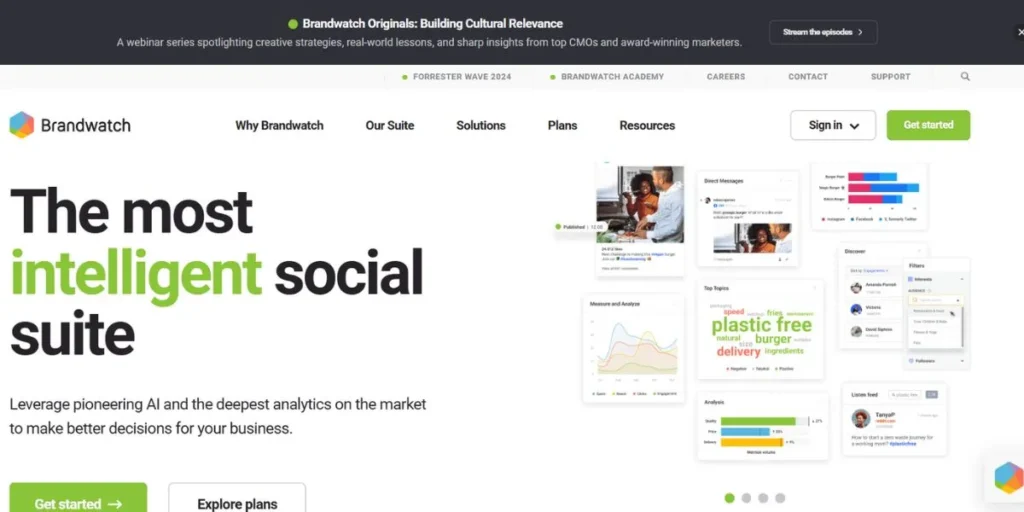
With Brandwatch, businesses now have access to advanced social listening fueled by artificial intelligence and machine learning. Brandwatch’s AI-powered system scours over a million social media discussions a day to give detailed reports on public opinion about a company, how the market changes, and what consumers do. As a comprehensive Business Reputation Management Tool, Brandwatch helps clients understand what their audience feels, track how well their advertising works, and even predict what their audience will do next. The system’s multidimensional data gathering and analytics enable it to provide strategic advice, supplemented by data-supported insights and market intelligence.
Key Features for Branding & Visual Identity
- Advanced sentiment analysis with emotion detection and trend forecasting
- Customizable dashboards with white‑label reporting and brand‑specific visualizations
- Partner identification and engagement tracking on strategic collaborations.
- Crisis management alerts with real‑time notification and escalation protocols
Pros:
- Comprehensive data coverage across global social platforms and news sources
- Powerful AI‑driven insights with predictive analytics capabilities
- Excellent customer support with dedicated account management
Cons:
- High cost barrier for small and medium businesses
- Intensive learning curve that involves training and experience.
- Interfaces can be too complicated to be used by a casual user.
Pricing: Individual pricing – will be priced at $800 and more per month based on access and utilization of data.
Best For: Large agencies and organizations that need general social awareness and high-order analytics
2. Yext
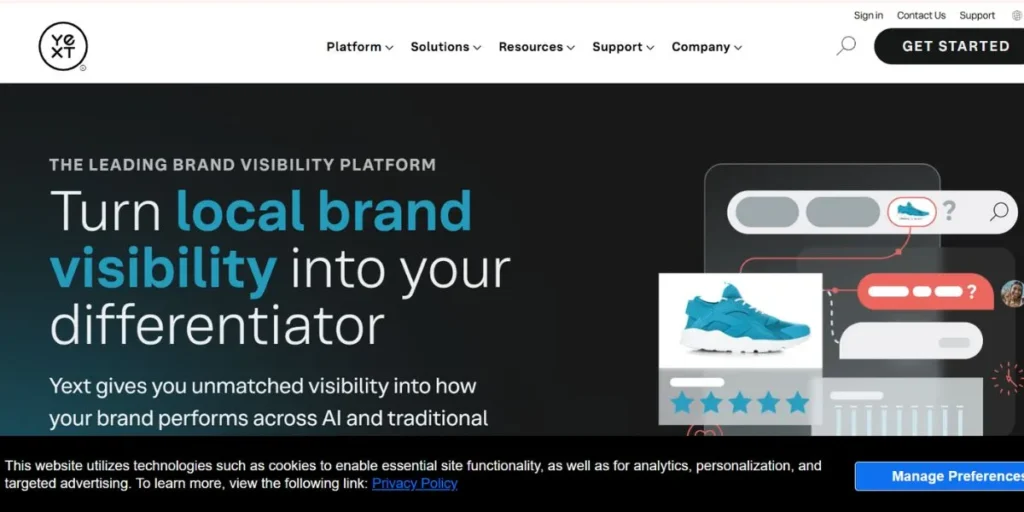
Yext specializes in the digital imputation of unstructured knowledge, resolving discrepancies in business information on search engines, online directories, and review platforms. As a comprehensive Business Reputation Management Tool, it offers specialized NAP (Name, Address, Phone) data review, local SEO, information accuracy automation, review oversight, and NAP alphanumeric data management tools. With coverage across over 200 digital properties, Yext serves geo-targeted businesses. The solution automates the suppression of misinformation in local digital properties, synchronizes data corrections, and optimizes total listing visibility in local search results.
Key Features for Branding & Visual Identity
- Manage more than 200 platforms but store your business data in a single location.
- Read reviews with templates and comment on them automatically.
- Improve local search results with keyword tracking and ranking reports.
- Ensure that your brand appears in the same place across the Internet.
Pros:
- Large network of publishers that automatically update data.
- Great local SEO that achieves prominent ranking.
- Simple to use interface that is easy to navigate and install.
Cons:
- Not all the capabilities of social media monitoring of specific tools.
- When there are lots of locations, costs can increase rapidly.
- Mainly used to assist with listings and not to do reputation management.
Pricing: Plans start at $199 per month per location and do have three-location discounts.
Best For: Local and franchise stores, and big corporations with numerous stores that would like to appear on search.
3. Sprout Social
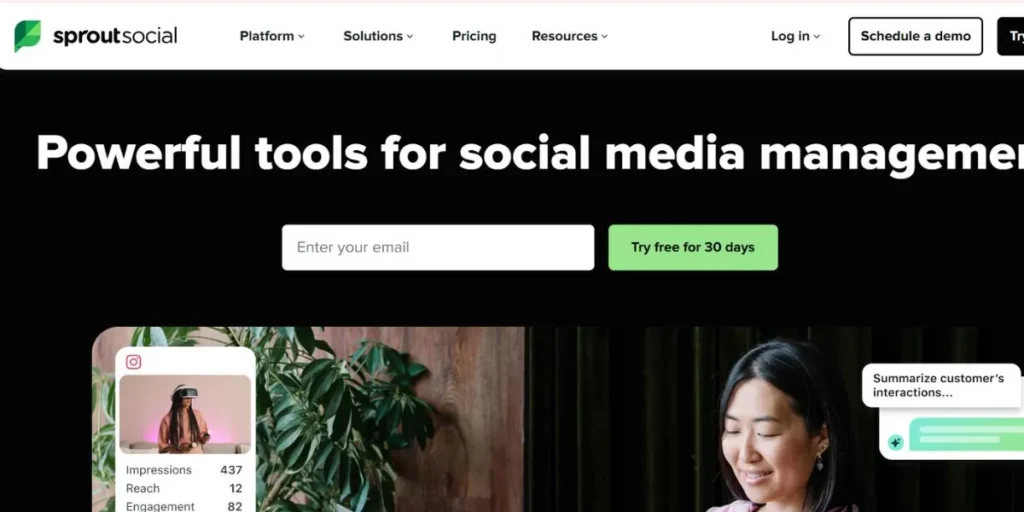
Sprout Social relates to the social domain and to the brand as well, focusing on social media to offer a range of tools for scheduling content, community management, and analytics. As a comprehensive Business Reputation Management Tool, the system uses advanced analytics, customer support integration, predefined workflows, and CRM systems. The client’s consolidated social account analytics balance the social profiles of a brand through the Smart Inbox. The main purposes of Sprout Social include increased automation of tasks, simplification of complex processes, fostering team collaboration, improved scheduling for content delivery, and social media stream-driven reporting.
Key Features for Branding & Visual Identity
- One, social media management allows handling all your accounts in one location, time-scheduling posts, and automatically publishing them.
- Brand voice consistency tools with approval workflows and team collaboration
- The visual content calendar provides your drag-and-drop planner of the campaigns.
- Customer support integration allows you to follow support tickets and reach response times directly on the site.
Pros:
- Smooth user interface that is user-friendly and accelerated.
- Powerful collaborative tools assigning roles, creating permissions, and making approvals.
- Detailed reporting allows you to select the desired metrics and provides results on autopilot.
Cons:
- The social listening only supports the costly add-ons.
- It is less integrated with review platforms than purpose-built solutions.
- More costly are advanced capabilities and a number of user seats.
Pricing: Plans begin at $249/month. A 30‑day free trial is available.
Best For: Social media departments, companies and agencies which have an interest in socializing but not overseeing management.
4. GatherUp
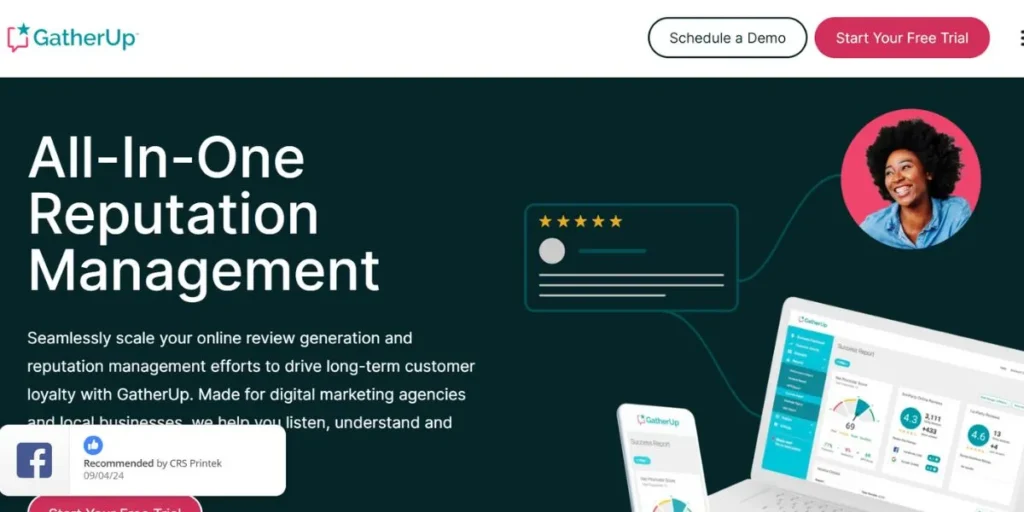
GatherUp further disconfirms the enduring claim that the only good review is one that is unsolicited. As a robust Business Reputation Management Tool, it optimizes business processes by addressing negative feedback automatically. Automated review requests streamline the review collection process and support monitoring across multiple platforms. Workflow automation integrates follow-up analytics with responsive review systems aligned to customer and market conditions, providing granular timing insights. Built with intelligent outreach and anti-spam filtering, the solution ensures seamless and authentic feedback collection while enhancing customer satisfaction scores.
Key Features for Branding & Visual Identity
- Review requests that can be scheduled and phrased to your preference.
- Review of monitors on most of the sites and receive automatic alerts.
- Review software to respond to feedback, including templates and a confirmation process.
- Calculate your rating, discover trends, and competitor ratings.
Pros:
- Obsessed with securing reviews with strategies that pay.
- Small and medium businesses can afford the price.
- Connections to other business tools and your existing CRM are easy.
Cons:
- Not tracking social media other than review sites.
- Basic analytics are in comparison basic.
- Mainly about review management, not a full reputation plan.
Pricing: Plans start $99 a month, 14-day trial and installment assistance.
Best For: small to medium businesses who have more favorable reviews and customer feedback control.
5. Trustpilot
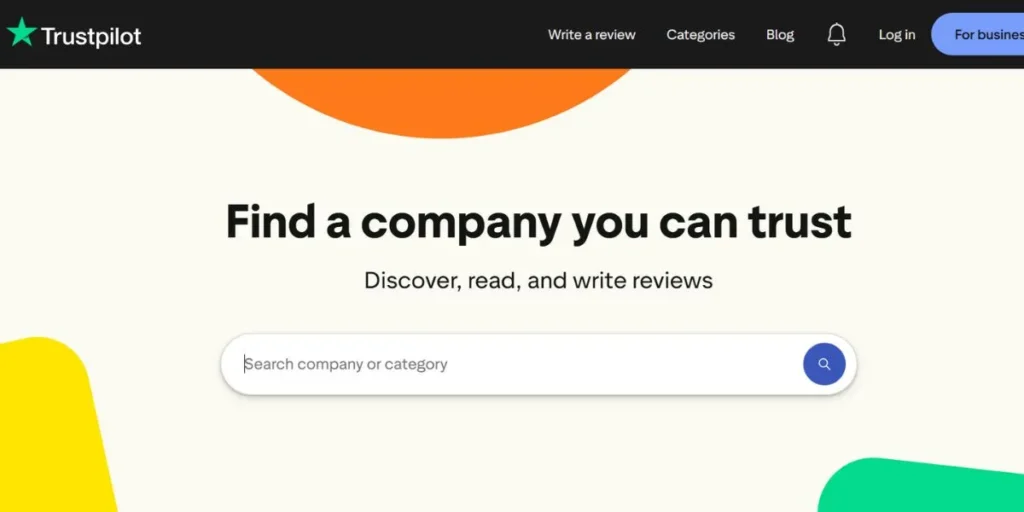
Trustpilot is fully refundable upon request under reasonable conditions, such as damage to the service endorsed or ordered. As a comprehensive Business Reputation Management Tool, the service includes response tools, analytics, and monitoring, handling customer feedback collection through fully automated systems. Collecting reviews helps reestablish trust that has been damaged or lost, and trust badges and review widgets significantly boost the site’s credibility and sales funnels. Automated tools detect deceptive reviews and verify their original sources using consumer protection, analytics, and review verification systems. The platform’s in-depth consumer insights integrate multi-dimensional business strategy and customer experience alignment, providing structured industry benchmarking for better decision-making.
Key Features for Branding & Visual Identity
- Gather validated reviews, identify fraud and maintain data integrity.
- Include a badge of trust to improve credibility and conversion of the site.
- Reviews with customizable and optional filterable widgets.
- Analyze reputation with industry benchmarks and trend insights.
Pros:
- Builds strong consumer trust with a global platform presence.
- Enhances SEO through rich snippets that display in the search results.
- Any review gathering and presentation is confirmed and sound.
Cons:
- Platform rules and moderation are not in your control.
- Depends on Trustpilot only, not on multiple review sites.
- Unfavorable reviews can be seen and can be perceived.
Pricing: Starting at 199 a month, there are features and volume plans.
Best For: E commerce stores and service companies that care about verified and trusted customer reviews.
6. Mention (Monitoring)
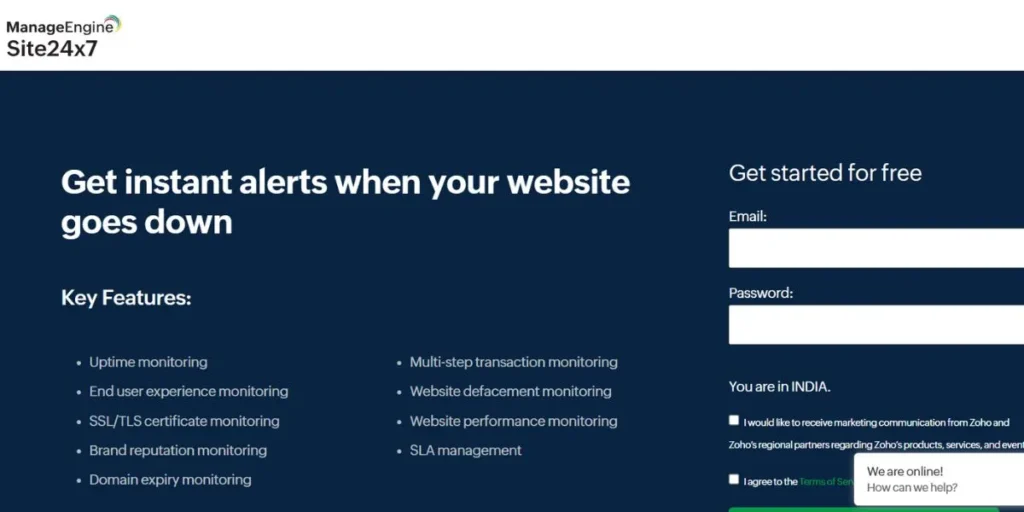
Mention provides extensive online monitoring and real-time alerts for social media, news sites, blogs, and forums. As a powerful Business Reputation Management Tool, it combines a simple interface with features like sentiment analysis, influence scoring, and competitive intelligence, making it valuable for companies of any size. The system’s competitive pricing ensures even small and startup businesses can afford professional monitoring. Its speed, accuracy, and effectiveness focus on actionable insights, while comprehensive brand protection monitoring provides exhaustive coverage across all digital channels.
Key Features for Branding & Visual Identity
- Monitor your brand in real‑time on the web, social media, and news sites.
- Monitor sentiment and trend with regard to how people feel about your brand.
- Track competitors and compare performance for better market insight.
- Discover influencers and their reach and engagement.
Pros:
- Affordable pricing and full monitoring with no hidden costs.
- Simple interface that can be learnt by most.
- Quick notices which can be configured to your choice of notification.
Cons:
- Lacks as many sophisticated analytical tools as premium services.
- Simple responses to feedback that are not automated.
- Less data coverage than enterprise‑level tools.
Pricing: Plans begin with $25 a month. 14-day trial and upgrade flexibly.
Best For: Startups, small businesses, and agencies with a tight budget who desire a cost-effective brand monitor.
7. Google Alerts
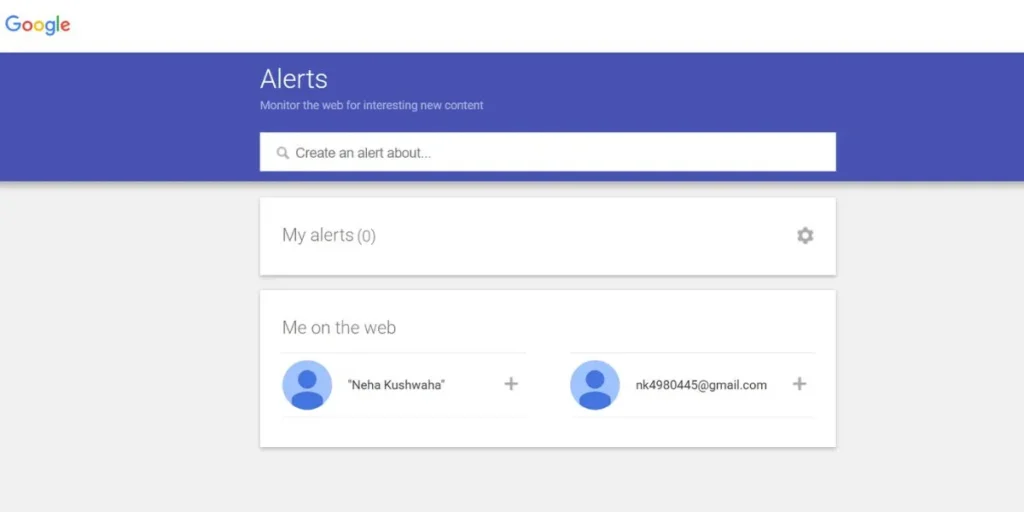
Google Alerts provides fundamental brand monitoring through emails whenever specified terms are found on the web. Compared to professional services, it captures only a fraction of what is available, however, it provides useful insights in the form of web content about the brand, news articles, and blog entries. This free service is useful to companies whose monitoring requirements are basic and straightforward. The system provides reliable and organized alerts, fine-tuned to the user’s parameters, while avoiding unwanted complexity, thereby streamlining the system to provide basic brand awareness features of fundamental importance.
Key Features for Branding & Visual Identity
- Monitoring selected words by creating searches of your choice and frequency of updates.
- Email alerts, one-page summaries or instant notification.
- Choosing where to search: news, web, videos or discussion sites.
- Having multiple alerts in campaigns to track
Pros:
- Completely free service with unlimited tracking of keywords.
- Fast to install and only requires a Google account and the selection of keywords.
- Accurate alerts which you can schedule the frequency.
Cons:
- Does not visit social media sites, only looks at Google search.
- Lacks feelings analysis or deep data
- Alerts are easy; no tool to respond and to write a workflow.
Pricing: Completely free with no limits
Best For: Small companies, new enterprises or individuals who need basic brand tracking at an affordable price.
8. Birdeye

Birdeye provides a single platform for customer experience with reviews management, social listening, business messaging, and customer surveys. It uses AI to automate sentiment analysis and actionable review routing with change recommendations in real time. It is especially suited for centralized control multi-location businesses with a comprehensive approach. The platform focuses on control, integration, and fusion in delivering unified customer experience. This drives business growth through operational streamlining, engagement enhancement, strategic feedback, and balanced performance optimization.
Key Features for Branding & Visual Identity
- The way the AI automates reviews by timing and using personal messages.
- A single control panel to manage numerous places with a possibility to adjust each location.
- Sharing, viewing and replying to social media.
- Reviewing the customer feedback to identify emotions and provide suggestions.
Pros:
- Includes all that you require to take care of your reputation.
- Strong AI is used to automate and provide smart advice.
- Good help with a personal manager and training
Cons:
- Costs more than simple single‑feature tools
- The installation is slow and the staffing is costly.
- There are so many choices, and individuals prefer something straightforward.
Pricing: $299 a month per location and large businesses receive custom pricing.
Best For: Small businesses, startups or people who only need basic brand monitoring at minimal cost.
9. Brand24 (Sentiment Analysis)
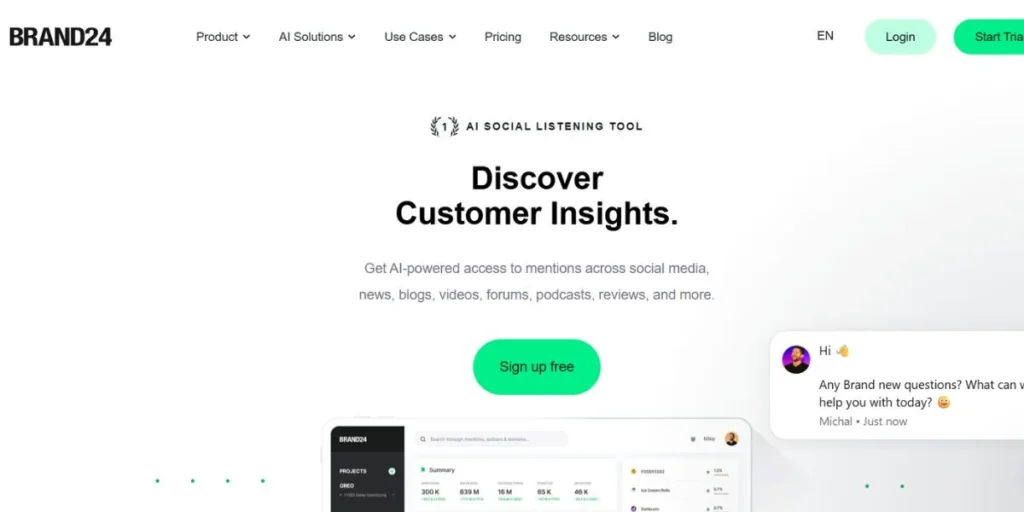
Brand24 evaluates the reputation online for socials and analytics and follows the brand mentions in real time over social networks, news and discussion forums. Brand24 offers analysis and strategy that in-depth insight and analytics, competition and influence and offers SME friendly pricing. Brand24 actionable reputation insights and monitored emotional systems frameworks are some of the strongest in the market. Brand24 along with business and market strategists planners built reputation sentiment models which are deeply grounded in strategic evidence-based defensive management.
Key Features for Branding & Visual Identity
- Advanced sentiment analysis with emotion classification and trend identification
- Social media monitoring with platform specific insight and engagement analysis
- Competitive analysis with market share tracking and brand comparative tools
- Influence scoring with reach analytics and audience assessment
Pros:
- Sentiment analysis with higher accuracy and detailed emotional attribution
- Fairly priced and customizable plans for growing companies
- Customizable dashboards with ease reporting and data visualization features
Cons:
- Few response management features with no workflow automation
- Data coverage is smaller in comparison to enterprise monitoring solutions
- Basic review platform integration that is social media centric
Pricing: Offers start with $79 a month with 14 day no cost trial and flexible scaling
Best For: Social media and sentiment analysis focused small to medium companies
10. NetReputation
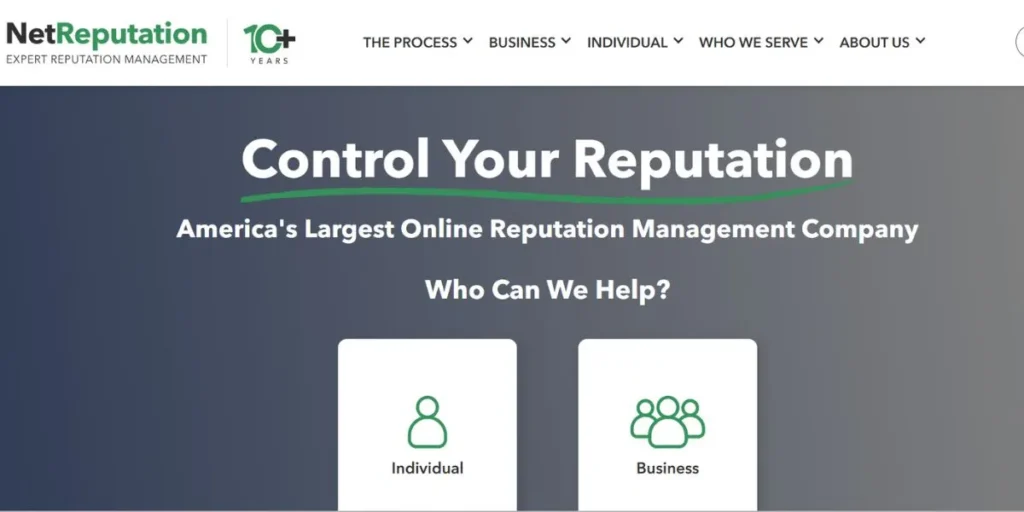
NetReputation’s brand recovery and crisis resolution services are among the most innovative in the industry. Using a unique multi-pronged approach, the company resolves online reputation issues, including negative content suppression, adverse search result suppression, and brand perception recovery. Values underpinning the recommended approaches are systematic brand recovery and intervention technique deeply values strategic foresight. The service maintains ethical positions during complex situations and engagements requiring intervention from seasoned strategic planners and recovery specialists. Under their guidance, personalized consultation, content creation, and recovery tactics yield the desired outcome and positive net reputation for brandNetReputation.
Key Features for Branding & Visual Identity
- Crisis management services that get involved to prevent damage.
- Assist in closing negative material with SEO and new content.
- Monitor your reputation and warn you about threats.
- Launch a fresh positive content and promotion.
Pros:
- We are experts in reputation issues solutions and crisis management.
- People are not machines and we make your strategies.
- Our track record of reputation management is solid.
Cons:
- It is expensive as it requires a massive budget.
- It is a service, it is not a self-service tool.
- It is more time-consuming than automatic tools.
Pricing: The price is determined following a discussion and an in-depth study of your reputation problems.
Best For: Firms with severe reputation issues, bad-online-content, or require the services of a professional reputation-saving firm.
How to Choose the Right Reputation Management Tool in 2025
- Budget Evaluation: Assess available resources against total cost of ownership including installation, training, and subscription fees, if any.
- Business Size Alignment: Align tool capabilities from basic monitoring for startups to enterprise-level analytics for larger businesses.
- Platform Expanse: Verify monitoring of all pertinent social media, review, news, and other relevant industry tools.
- Integration Requirements: Assess ease of integration to internal business systems and other CRM and marketing workflow tools.
- Team Hard Skills: Assess the skills and other training required for successful platform implementation, use, and maintenance.
- Flexibility Strategy: Identify options that provide for rapid addition of business activities, geography, and additional reputation management.
Benefits of Using Reputation Management Tools
- Proactive Issue Detection: Resolving issues arising from reputation threats reputation issues much more easily when problems are identified during the early stages.
- Improved Customer Relations: Customers are engaged in a more timely and productive manner when prompt reply policies are in whose response policies are prompt.
- Competitive Intelligence: Analysis of the is helpful in making strategic moves toward improvement in position and reputation
- Time Efficiency: Automated monitoring and response reduces the amount of manual work needed for thorough reputation coverage for a particular platform.
- Data-Driven Strategy: An organization’s strategies can be easily monitored, and managed through rationally constructed reputation systems based on available evidence.
- Crisis Prevention: As a result of the outcome, the reputation of the firm is damaged because the monitoring and alert systems did not work effectively.
Conclusion
Looking at the various tools available in the market, we can say that the right reputation management tool in 2025 depends on the sector’s needs, planned budget, and the new heights a company plans to achieve. There are basic free tools for monitoring and there are AI-driven enterprise-level platforms. Tools for reputation and review management, social media monitoring, or all-in-one tools can be chosen. What matters is to make sure that the tool serves the purpose and is used strategically.
For specialized review management, social media monitoring, reputation management, or all-in-one platforms, consistent implementation and strategic utilization are crucial. The right tool can enhance professional investment and improve customer trust, brand perception, and revenue and market competitiveness in the digital marketplace.
FAQs
How are paid reputation management tools different from free reputation management tools?
Paid applications provide more advanced metrics and monitor multiple platforms than free applications, such as Google Alerts, which are easier and provide less tracking capabilities.
What is the right frequency of monitoring business online reputation?
Active brands are better supported by real-time monitoring, and most business organizations enjoy the benefits of daily alerts and weekly in-depth reviews. Monitoring with immediate alert notifications is necessary in high-visibility firms or where the company is in crisis.
Does a reputation management tool get rid of negative feedback?
There is no way to legitimately remove a bad review using tools, but they can assist professional responses, attract positive responses, repress poor-quality material using SEO, and report violations of the platform policy.
How much ROI can businesses get out of reputation management tools?
Research indicates online reputation can drive revenue through conversion rates, purchase acquisition expenses and pricing possibilities 5-20 percent, and the ROI is usually achieved in 3-6 months.
What are the ways AI features can be used to improve reputation management in 2025?
Sentiment analysis, automated responses, predicted crisis detection, individualized timing of review requests, and making reputation management more efficient and effective than manual tactics are all powered by AI.

